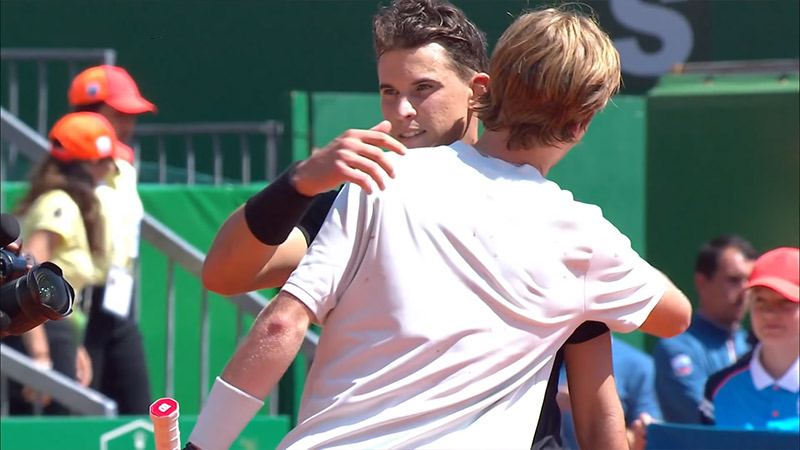Tennis, with its captivating rallies and fierce competition, is a sport steeped in tradition and rules. One term that often perplexes both seasoned enthusiasts and newcomers is “retired.”
What exactly does it signify when a tennis player retires from a match? In this blog post, we delve into the intricacies of this term and unravel its meaning in the context of tennis.
From understanding why players retire to the consequences of such a decision, we’ll provide a comprehensive overview.
Whether you’re a dedicated fan, or a casual observer, gaining clarity on what “retired” means in tennis is essential to appreciate the dynamics of the game and the impact it has on players, tournaments, and spectators. So, stay focused.
The Basics of Tennis Match Outcomes
Tennis match outcomes are determined by the best of three or five sets, with the winner being the first to secure the majority. Each set is won by the player or team who reaches six games first, with a minimum two-game lead.
If the score reaches 6-6, a tiebreaker is played. In a best-of-five set match, the winner must secure three sets.
Scoring within games is 15-30-40, and a player must win four points to win a game. When both players have 40 (deuce), one must win two consecutive points to secure the game.
Matches can be won in straight sets (e.g., 3-0 or 2-0) or go the distance, requiring a decisive fifth set. Tennis matches can vary in duration, tactics, and style, offering a captivating and dynamic spectator experience.
What Does Retired Mean in a Tennis Match?
If the fact of retiring seems confusing to you, it’s good to people know what does it mean to retire in tennis.
In a tennis match, “retired” refers to a situation when a player decides to withdraw or stop playing before the match is officially over.
This can happen for various reasons, and it is recorded as “retired” in the match results. Here are some elaborated points about what “retired” means in a tennis match:
Injury or Illness
The most common reason for a player to retire from a match is due to injury or illness.
If a player sustains an injury during the match that prevents them from continuing, they may retire to avoid exacerbating the injury.
Similarly, if a player falls ill or is unable to compete at their best due to a sudden ailment, they may retire to prioritize their health.
Preventing Further Damage
In some cases, a player may retire to prevent further physical or emotional damage.
If they are trailing significantly or feel that they cannot compete effectively, they may choose to retire to avoid a humiliating defeat or additional physical strain.
Retirement Consequences
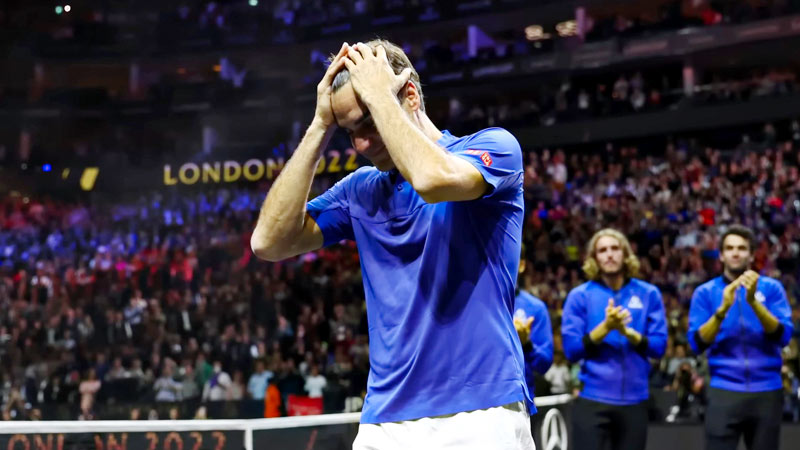
When a player retires from a match, their opponent is declared the winner, and the match is recorded as a retirement in the official records.
The opponent is credited with the victory, and the retiring player may face consequences, such as losing prize money or ranking points, depending on the circumstances and tournament rules.
Disqualification or Default
A player can also be retired if they are disqualified or defaulted by the chair umpire due to misconduct, such as unsportsmanlike behavior, racquet abuse, or excessive arguing with officials.
This is not a voluntary retirement but rather a decision made by the match officials.
Impact on the Tournament
Player retirements can affect the flow and integrity of a tennis tournament. In some cases, it can lead to changes in the tournament schedule or the need for substitutes to fill the vacant spot in the draw.
Additionally, spectators and fans may be disappointed when a match ends prematurely, impacting their overall experience.
“Retired” in a tennis match signifies that a player has voluntarily or involuntarily ceased to compete before the match’s natural conclusion.
When and Why Players Retire in Tennis
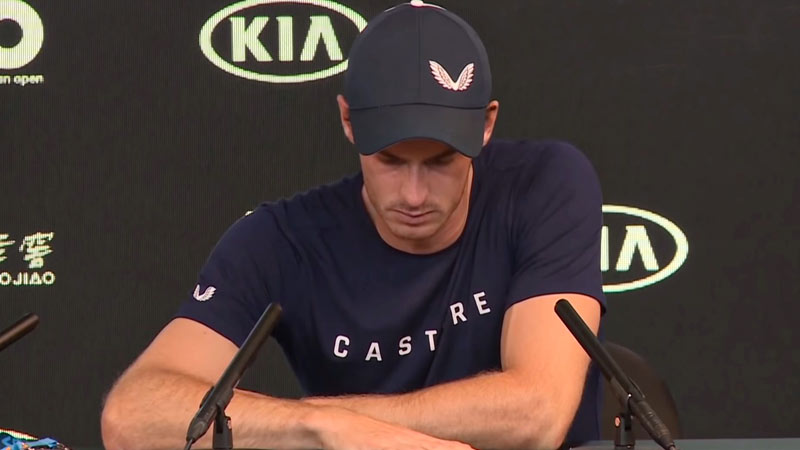
Players retire in tennis for a variety of reasons, and the timing of retirement can vary significantly. Here’s a breakdown of when and why players retire in tennis:
When
- During a Match: Players may retire from a match at any point if they suffer an injury, or illness, or simply cannot continue due to various circumstances. This can happen in the early stages or even when they are close to winning or losing a match.
- Between Sets: Some players choose to retire between sets, typically due to physical discomfort, exhaustion, or injury. This allows them to avoid further injury or strain.
- Before a Tournament: Players can withdraw from a tournament before it even begins due to injury, illness, or personal reasons. This is often done to prevent further damage or to prioritize recovery.
- Mid-Match Due to Misconduct: In rare cases, players may be defaulted or disqualified for misconduct, which results in an immediate retirement from the match.
Why
- Injury: Injuries are a common reason for player retirements. A player may experience a sudden injury during a match or be dealing with a pre-existing injury that hinders their performance.
- Illness: Illness, whether it’s a minor illness or a more serious condition, can force a player to retire from a match or withdraw from a tournament to focus on recovery.
- Physical Exhaustion: Tennis matches can be physically demanding, and players may retire when they are physically exhausted and unable to continue at their best.
- Mental Fatigue: Tennis is mentally taxing as well. Players may retire due to emotional or mental fatigue, especially if they are trailing in a match and feel overwhelmed.
- Misconduct: Players can be disqualified and retire from a match if they engage in unsportsmanlike conduct, violate the rules, or show disrespect to officials or opponents.
- Personal Reasons: Occasionally, players retire due to personal or family-related issues that require their immediate attention.
- Retirement from the Sport: At some point in their career, tennis players may decide to retire from professional tennis altogether. This decision can be influenced by factors like age, declining performance, career goals, or personal preferences.
Consequences of Tennis Players Retired During Match
When a tennis player retires during a match, there are several consequences, both immediate and long-term, that impact not only the player but also the opponent and the tournament.
Here are some elaborated points on the consequences of a player retiring during a tennis match:
Match Outcome
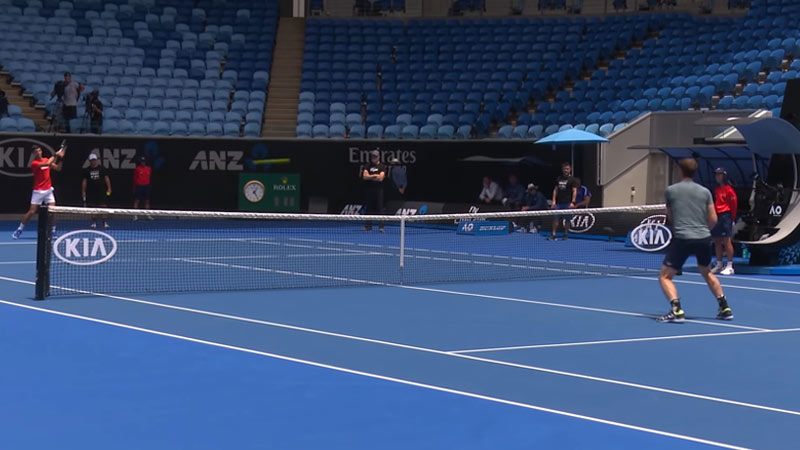
The immediate consequence of a player retiring during a match is that their opponent is declared the winner.
The match is recorded as a retirement in the official records, and the retiring player forfeits the match, sets, and games to their opponent.
Prize Money and Ranking Points
Depending on the tournament rules, a retiring player may forfeit their prize money and ranking points for that particular match.
This can have financial and ranking implications for the player, affecting their overall standing in the sport.
Tournament Schedule Disruptions
Player retirements can disrupt the tournament schedule. Matches may need to be rescheduled, and it can lead to delays in the tournament’s progress, affecting other players, spectators, and TV broadcasters.
Opponent’s Preparation
The player who was winning at the time of the retirement may feel frustrated and potentially unfulfilled as they didn’t have the opportunity to finish the match properly. It can also disrupt their rhythm and momentum.
Fan Disappointment
Tennis fans who attend matches or watch them on TV may feel disappointed when a match ends prematurely due to retirement. This can affect the overall viewing experience and fan satisfaction.
Health and Recovery
The retiring player may be making a prudent decision to prioritize their health and recovery, especially if they are dealing with an injury or illness.
While this is a responsible choice, it can still have consequences in terms of missed opportunities in the tournament.
Psychological Impact
Retiring during a match can have a psychological impact on a player. They may feel demoralized, frustrated, or even guilty for not being able to complete the match.
Overcoming the mental challenges of retiring can be a significant aspect of their recovery.
Tournament Officials’ Decisions
In some cases, tournament officials may investigate the circumstances of the retirement, especially if there are suspicions of gamesmanship or misconduct.
This can lead to penalties or further consequences for the retiring player.
Retiring during a tennis match has several immediate and long-term consequences, ranging from the match’s outcome and financial repercussions to the impact on the tournament schedule, players’ psychological well-being, and fan experience.
The Etiquette and Controversies of Retiring in Tennis
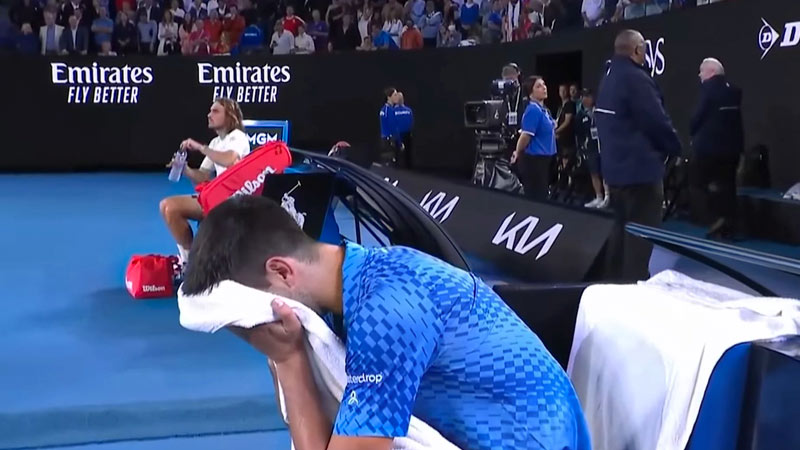
The retirement of a tennis player during a match can raise questions of etiquette and occasionally spark controversies within the sport.
Here are some elaborated points on the etiquette and controversies surrounding retiring in tennis:
Etiquette and Sportsmanship
- Tennis has a long-standing tradition of sportsmanship, and retiring is generally seen as a last resort when a player is genuinely unable to continue due to injury, illness, or other compelling reasons.
- Proper etiquette dictates that players should inform their opponent, the chair umpire, and the tournament officials as soon as it becomes clear that they can’t continue. This allows the opponent to be aware of the situation and minimizes any disruption to the match.
Injury Timeouts and Medical Assessments
- Some controversies arise when players take injury timeouts and medical assessments during a match. Opponents and spectators may question the legitimacy of these requests, especially if they seem strategic rather than necessary.
- Tennis authorities and officials must balance the need to ensure fair play with the importance of player health and safety. Clear guidelines and medical assessments are used to determine the seriousness of injuries.
Psychological Warfare
- In some cases, retiring from a match can be used as a tactical maneuver to disrupt an opponent’s rhythm or concentration. This has led to suspicions of gamesmanship and has generated controversy within the tennis community.
- To address this issue, tournament officials and the International Tennis Federation (ITF) have rules in place to discourage players from using retirement as a strategic ploy. They may investigate the circumstances surrounding retirements to ensure their legitimacy.
Fan and Sponsorship Impact
- When high-profile players retire during a match, it can disappoint fans and impact the tournament’s overall appeal and financial interests. Sponsors and broadcasters may also be affected, as they invest heavily in these events.
- Controversies can emerge when fans, sponsors, or broadcasters perceive that retirements are occurring without legitimate reasons, potentially harming the image and marketability of the sport.
Long-Term Consequences
Retiring frequently due to non-serious reasons can have long-term consequences for a player’s reputation.
It can lead to skepticism from both opponents and fans, and it may affect their overall standing in the sport.
The etiquette and controversies surrounding retiring in tennis stem from the balance between sportsmanship and player health, as well as concerns about the potential misuse of retirements for strategic purposes.
FAQs
What does ret mean in tennis?
“Ret” in tennis stands for “retired.” It is used to indicate that a player has withdrawn from a match due to injury, illness, or other reasons, and their opponent is declared the winner.
Who wins a retired tennis match?
In a retired tennis match, the opponent of the player who retires is declared the winner. The retiring player concedes the match due to injury, illness, or other factors.
What does finished retired mean in tennis?
“Finished retired” is not a standard term in tennis. When a player “retires” during a match, it means they withdraw from the game, giving victory to their opponent. There is no specific meaning for “finished retired.”
Why do tennis players retire so early?
Tennis players may retire early in their careers due to various factors, including injury, declining performance, or personal reasons.
The physical and mental demands of professional tennis can lead to early retirement.
Do tennis players get paid if they retire?
Tennis players typically earn prize money based on their performance in tournaments.
If they retire from a match, they may still receive prize money they’ve earned up to that point, but it varies depending on the tournament’s rules and circumstances.
Wrapping Up
In the world of tennis, the term “retired” carries significant weight, and understanding its implications is essential.
Whether it’s due to injuries, illness, misconduct, or personal decisions, retirements shape the sport in various ways. They can lead to joy for one player and disappointment for another.
Retiring during a match has immediate consequences in terms of match outcomes, prize money, and tournament scheduling, but it can also have long-term effects on a player’s reputation and career.
Balancing sportsmanship, player welfare, and the integrity of the game is an ongoing challenge for tennis authorities.
Comprehending what “retired” means in a tennis match offers insights into the etiquette and controversies surrounding this decision, enriching the way we view and appreciate this thrilling and unpredictable sport. Thank you so much.

